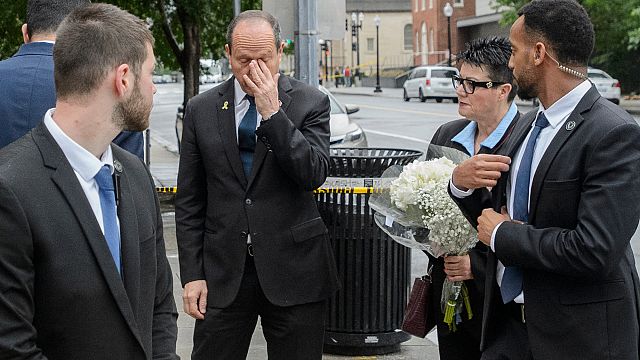In a tragic turn of events outside the Israeli Embassy in Washington, Israeli Foreign Minister Gideon Saar solemnly announced the identities of two embassy staff members who lost their lives in a horrifying shooting incident. Yaron Lischinsky and Sarah Milgrim, dedicated individuals contributing to the embassy’s operations, were fatally shot as they were leaving a Jewish cultural event at the Capital Jewish Museum in Washington D.C.
The shock and sadness reverberated not just within the embassy walls but across the globe as Saar labeled the incident a terrorist attack driven by the alarming surge in antisemitic rhetoric worldwide. Lischinsky, a diligent research assistant, and Milgrim, instrumental in coordinating diplomatic visits and cultural missions to Israel, were integral parts of the embassy’s efforts to foster international relations and cultural exchange.
Saar’s poignant words did not mince the severity of the situation, linking the tragic event to a broader narrative of escalating tensions and violence stemming from previous conflicts. The shadow of the deadly Hamas-led attack on Israeli communities, which sparked the ongoing war in Gaza, loomed large over the recent shooting, underscoring the interconnected nature of global conflicts and their repercussions.
The perpetrator, identified as 31-year-old Elias Rodriguez from Chicago, brazenly unleashed violence upon the unsuspecting embassy staff, shouting provocative slogans during the attack. The swift apprehension of Rodriguez by event security offered a semblance of closure amidst the chaos, but the scars left by the incident run deep, echoing the vulnerability faced by Israeli diplomatic missions in the current climate of heightened threats.
As Saar commended the rapid response of U.S. officials and the ongoing investigations, the stark reality of the risks faced by Israeli representatives worldwide came into sharper focus. The need for enhanced security measures at embassies and consulates globally underscored the pervasive threat posed by antisemitic terrorism, transcending borders and ideologies to strike at the heart of diplomatic missions.
The shooting serves as a grim reminder of the broader context of the Israeli-Palestinian conflict, a longstanding source of strife and discord with reverberations felt far beyond the region’s borders. Against the backdrop of Israel’s military operations in Gaza and the international community’s divided responses, the shooting outside the embassy symbolizes the deep-rooted complexities and dangers inherent in the unresolved conflict.
In a world grappling with the challenges of extremism, violence, and diplomatic impasses, the shooting in Washington stands as a poignant example of how conflicts thousands of miles away can manifest in tragic events on foreign soil. The need for dialogue, understanding, and concerted efforts towards peace becomes ever more pressing in the face of such senseless acts of violence.
As investigations unfold and authorities pledge to bring the perpetrator to justice, the collective resolve to safeguard diplomatic personnel and uphold the principles of peace and security remains unwavering. The echoes of the shooting outside the Israeli Embassy serve as a somber call to action, a stark reminder of the urgent need to address the root causes of conflict and strive towards a future where such tragedies are but distant memories.
Originally reported by Africa News
Read more at: http://www.africanews.com/2025/05/22/israeli-foreign-minister-identifies-victims-of-shooting-outside-embassy-in-washington/

